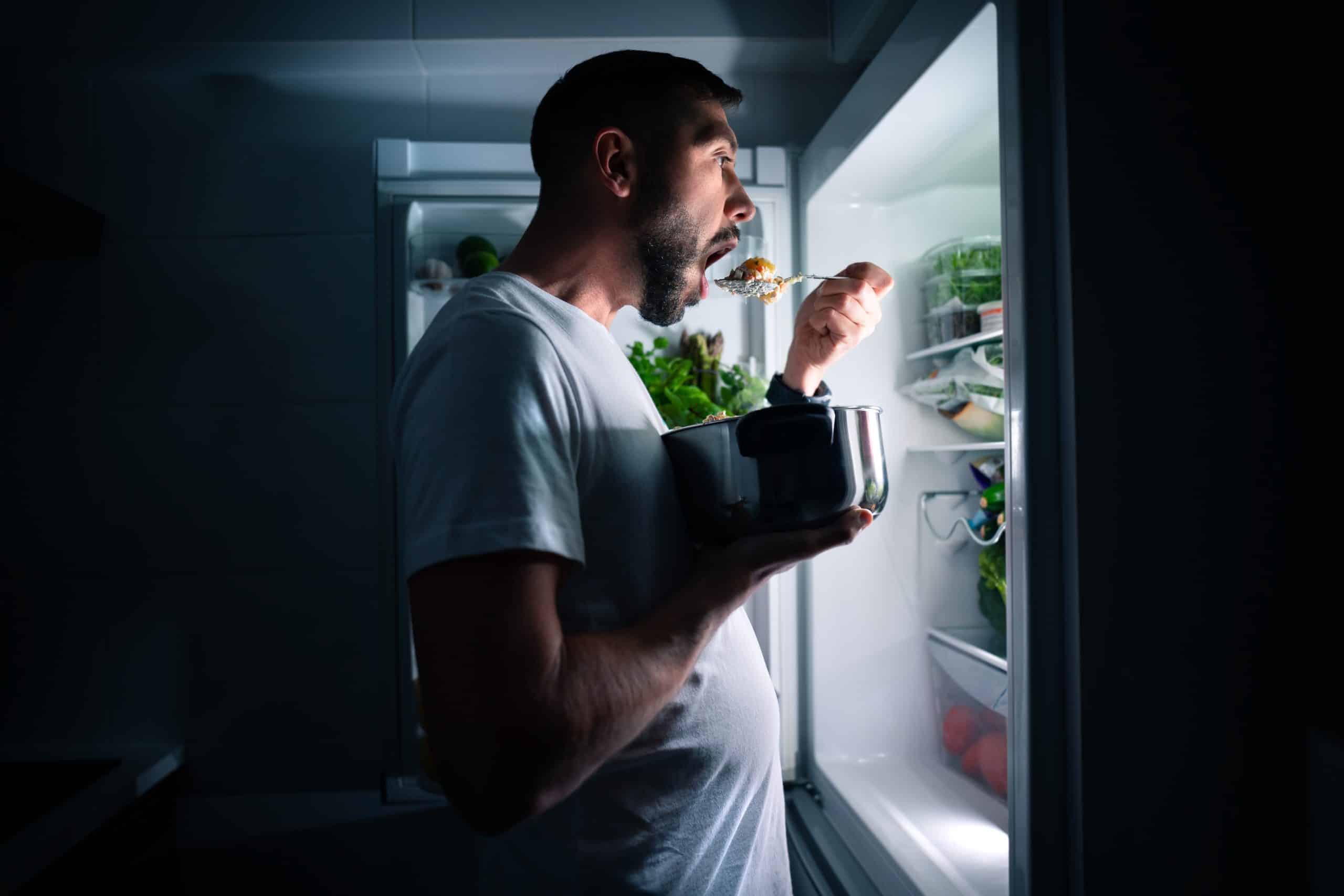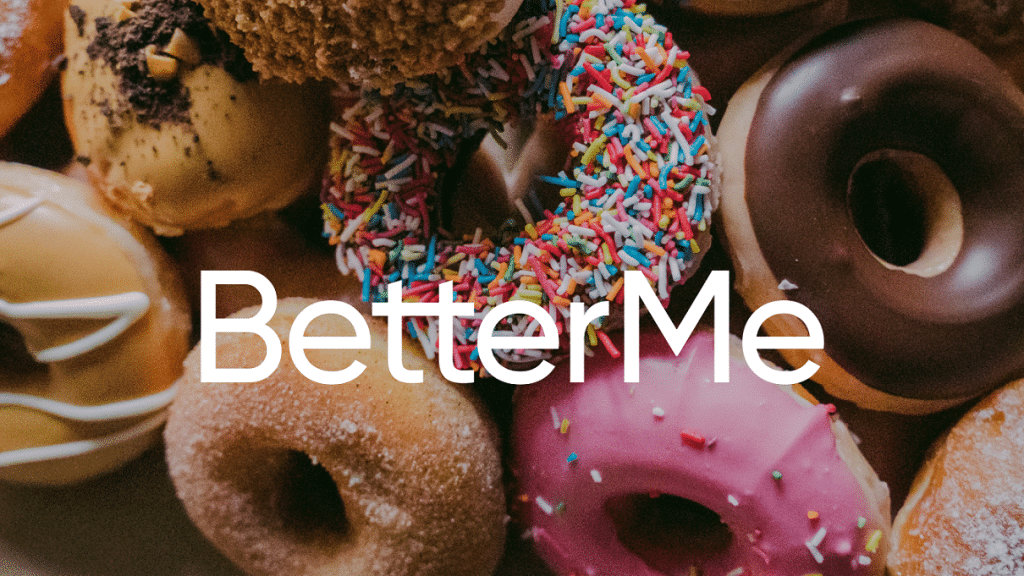Is the fridge light at midnight your enemy? The cravings for sweet treats and carbs can become unbearable late at night. The effects of these late-night binges might already be showing. Discover how to stop binge eating at night to end the cravings and fridge visits.
Nighttime binges weren’t ever your idea of living a healthy lifestyle. With this in mind, you already know why you shouldn’t binge late at night and need to find out how to fix it. Stick around for the facts that will help you stop binge eating at night. Let’s begin by looking at the two root causes.
The Ultimate Guide to Stop Binge Eating at Night
Before you stop binge eating, let’s understand what causes binge eating because you need to identify your reasons. Later, you’ll find tips and strategies to stop eating late at night.
What Causes Night Binge Eating?
Did you know that nutritional lifestyle changes require physical and mental commitment? Your brain is where everything goes wrong if you have an eating disorder, but your biological needs can also trigger this.
The Psychology of Binge Eating at Night
The Mayo Clinic defines binge eating disorder (BED) as a psychological illness (7).
WebMD compares BED to food addictions (16). Binge eating disorders have some similar characteristics to food addictions, although they are different conditions..
Scientists discussed how various foods become addictive (9). Like substances, specific foods trigger the reward loop in the brain. For example, foods containing refined sugars and saturated fats may cause neurological reactions.
The brain releases hormones to make you feel good, improving your mood. However, the mood boost is temporary and creates cravings for more. Scientific American already published similar findings from a study in rats in 2010 (3).
The brain runs heavily on a reward system that feeds habitual decisions. Dopamine floods your brain to make you feel better for a short while. When the effect wears off, you are likely to want more.
Emotional Reasons for Binge Eating at NightHow to Stop Binge Eating at Night
Neurological changes may mean you’ll also lean toward binge eating for emotional reasons. Compulsive eating can temporarily alleviate discomfort in the brain. The Yale University School of Medicine states how people with PTSD sometimes exhibit unhealthy rewarding behaviors (32).
Moods and cravings go hand-in-hand. Stress messes the reward-behavior interactions up, even making you avoid positive behaviors. The University of Iowa found that gratification associated with food consumption also activates the reward and pleasure centers to reduce depression temporarily (24).
So, poor mental health can affect your nighttime urges and appetite, and vice versa.
Intense sweat sessions, working weight loss tips, lip-smacking recipes come in one package with the BetterMe app. And all of it is at your fingertips, start transforming your life now!
How to Check If You Have an Eating Disorder
The Mayo Clinic lists the signs of BED (7):
- Sensing your eating behavior is out of control,
- Eating larger-than-normal amounts in short periods,
- Eating when you aren’t hungry,
- Eating ultra-fast during binges,
- Secretive eating habits,
- Frequent dieting without losing much weight.
- Feeling depression, disgust, shame, upset, or guilt about eating
WebMD suggests looking for these warning signs to recognize food addiction (16):
- You eat until you feel unwell,
- You do anything to find the food you love, even when it isn’t in stock,
- You overeat the same food, particularly saturated fats, and refined sugar,
- You often avoid social events or other responsibilities to prioritize eating,
- You worry about not eating certain types of foods or cutting down on them.
The Biological Reasons for Binge Eating at Night
Food addiction, BED, or night-eating syndrome (NES) are the most common causes. The University of Pennsylvania studied the behavioral links to night eating syndrome (2). It’s a behavioral response when your body needs nutrition or falls short at the day’s end.
Something may be affecting your circadian rhythm and driving you to not eat enough during the day in favor of eating at night. (2). When you don’t eat enough during the day, your body has a biological urge to replenish what it needs before sleep.
Another institution, Harvard Medical School, confirmed that the circadian rhythm does more than control sleep (31). It also triggers your body’s urges, cravings, and appetite. So, messing your rhythm up might cause your body to seek more calories before bed or during the night.
Simple Physical Causes of Binge Eating at Night
The Cleveland Clinic suggests highly restrictive diets can cause NES (25). Juice fasts, ultra-low-calorie diets, and extreme daily dietary restrictions could cause NES. Your body requires a specific amount of nutrition daily and will seek it before you sleep.
They also share more reasons why you may live with NES (25):
- Circadian rhythm disorders
- Many people with NES also have depression or anxiety
- Genetics
- Many people with NES also have other eating or substance abuse disorders.
How to Tell If You Have NES
Cleveland Clinic suggests watching for signs that you live with night eating syndrome (25):
- Eating many of your calories at night,
- Experiencing poor appetite during the day,
- Feeling depressed or anxious about your eating habits or when feeling hungry,
- Waking up during the night to eat.
Why You Must Control Binge Eating at Night
Gaining weight and poor mental health are reasons to control binge eating, but there are many reasons. The University of North Carolina has reviewed studies to find more health complications from binge eating (8). It showed increased risks for the following:
- Less mobility,
- Low self-esteem,
- Poor sex life,
- Substance abuse,
- Impulse control disorders,
- Other eating disorders,
- Major depressive disorder,
- Anxiety disorders.
If you think those reasons aren’t enough, let’s see the results of binge eating and obesity. The University of Illinois raised concerns about the increased risk of these problems with BED and excess weight, including (6):
- Higher blood pressure,
- Metabolic syndrome
- High cholesterol and/or triglycerides,
- Diabetes,
- Sleep apnea,
- Gall bladder disease
- Cancer.
When You Need Help for Eating Disorders
Please contact NEDA for assistance if you feel binge eating has deteriorated your quality of life or you resorted to secretive eating habits. Fortunately, you can get the National Eating Disorders Association anytime you need help (11). Send “NEDA” to 741741 in a crisis.
Read more: Calories Burned By Heart Rate: Should You Use This To Know How Much Weight You’re Losing?
How to Stop Yourself From Binge Eating at Night
You realize how vital it is to stop binge eating late at night. But, how can you stop it if your body and brain want the same thing? First, seek help from a medical professional if you think you may be suffering from an eating disorder. Steady, proven steps and advice will help you reduce or eliminate late-night snacks and carb cravings. Let’s see how you can do it.
How to Stop Binge-Eating Sweets at Night
Why do you crave sugar and candy at night? John Hopkins Medicine states that hypoglycemia is more common at night for people with diabetes (20). This returns to your body desiring what it didn’t get enough during the day. Candy, carbs, and salty snacks are familiar nighttime favorites.
First, please test your fasting glucose and insulin levels if you’re experiencing unusual sugar cravings at night. However, Joslin Diabetes Center recommends tips if you experience frequent nighttime glucose drops (5):
- Check your glucose levels before bedtime,
- Be consistent with your meals each day, never skipping one, especially dinner,
- Have a healthy snack an hour before bed, including dried fruit, fruit juice, or half a glass of fat-free milk,
Science Daily says your circadian rhythm may also make you crave sugar, salt, and carbs at night (37). So, it can be a physical problem without having diabetes. Science Daily recommends eating higher-calorie meals for breakfast and lunch and getting enough sleep if weight loss is the goal.
13 Ways to Stop Binge Eating at Night
Next, let’s focus on the tips that help you stop binge eating late at night. One way to tackle late-night cravings is to recognize your triggers and shuffle your meal times to cater to higher calories during the day. It’s also important to seek advice from a medical professional if you think you may have an eating disorder. That said, there are 13 more ways you can look at, before you discover which would be best for you.
Seek Support for Serious Eating Disorders
Did the University of Pennsylvania’s psychological markers meet your patterns (2)? In that case, you need to seek support and help for your mental state. Speak to an expert about depression symptoms, signs of an eating disorder, or cravings that affect your life.
Alter Your Daily Nutrition
Do the Cleveland Clinic’s NES signs fit your eating patterns (25)? If so, consider adding more calories to your daytime meals and fewer at night. Eat healthy, nutritious foods daily to meet your calorie needs (34).
Stay Away From “Quick Fixes”
Diets require balance to ensure you have all the macronutrients. Forget the crash diets that promise everything and deliver nothing. Instead, WebMD suggests eating balanced macros daily (23). Aim for roughly 20 to 35% fat, 10 to 35% protein, and 45 to 65% carbs daily.
Change Your Emotional State
Improved emotions reduce the urge to cope with food. Germany’s University Hospital Tuebingen suggests emotional regulation is essential to stop binge eating (15). The Mayo Clinic advises not to leave depression and anxiety unresolved (35). Seek professional help and learn healthy coping strategies.
Sleep Better to Crave Less
Sleep and eat better to change your body clock. Go to bed on time each night, wake up at the same time every day, and use eating routines for a nutritional clock reset. The Cleveland Clinic confirms how interrupted sleep-wake patterns cause binge eating at night (25).
Reduce Your Stress Levels
Stress also leads to binge eating. Medical News Today explains how stress hormones increase your appetite (14). Find ways to destress. The CDC recommends effective coping mechanisms to regulate emotions and reduce stress (33).
Eat Frequently During the Day
The Institute of Food Research found that restrictive eating habits lead to disordered eating (12). It causes a perceived lack of food. The Yale University School of Medicine suggests eating at least thrice daily to prevent binges (13). Start with a substantial breakfast daily.
Welcome More Protein Daily
Start eating more high-protein meals during the day to decrease your appetite. The University of Arkansas found that higher protein diets with frequent meals worked better to promote satiety (29). Use a balanced macronutrient diet and add only additional protein (22).
Add More Fiber
Another way to combat the physical side of night binges is to eat more fiber. Vegetables, whole grains, fruits, and unprocessed foods help you feel full longer. Pennington Biomedical Research Center has confirmed fiber is a functional food (18).
Drink More Water
Dehydration can make you feel hungry when you’re not. Purdue University examined the relationship between eating, hydration, and food (26). High-sugar drinks don’t provide a feeling of satiety, and in the end, make you consume more calories. Drink more water to fight it.
Buy Better Snacks
Don’t stop snacking. Change how you snack instead. Yale University confirms that snacks matter when it comes to controlling your appetite (27). WebMD has shared snack ideas with under 100 calories to help you eat frequently and stop binging (1).
Never Skip Meals
Skipping meals makes you hungrier later in the day. Eat 3 balanced meals and don’t skip breakfast.
Eat Intuitively
The National Eating Disorders Association explains how eating intuitively is a tool for recovery from eating disorders (36). Eat when you genuinely feel hungry and stop as soon as you feel full. Eat slowly, and be mindful of how your body feels to recognize when you’re full.
Dropping pounds by the dozens without putting yourself through the wringer is everyone’s weight loss pipe dream. But what if we told you that the BetterMe app can make that happen? Keep yourself in prime shape with our fat-blasting workouts, delicious budget-sparing recipes, and body-transforming challenges with our app!
Best Way to Stop Binge Eating at Night in Just 3 Steps
Always reach out for help with eating disorders. However, creating a routine is essential because humans are habitual creatures. It helps you create a new pattern if you set a routine. Let’s see how you can establish one.
Step 1: Set the Routine
Setting a healthy routine can start with making a schedule. Plan the times you sleep, eat, and snack daily to train your body clock to change. Planning your snacks might be hard initially, but put times down for them.
Step 2: Plan Your Meals
Planning meals may reduce the likelihood of impulsive eating. So, try to plan what you’ll eat at each meal. You could do this weekly or nightly to buy the necessary groceries.
Step 3: Prep Meals Beforehand
Finally, University Hospital Tübingen found the sight of food can already trigger disinhibition of your impulses (21). That said, cook meals ahead of time to store in the fridge. Pre-cooked meals help because you instead have healthy food waiting to trigger your response.
FAQs
Is Binge Eating at Night Bad?
Binge eating at night can be bad for your health. The University of Illinois calls it binge eating disorder and shares numerous associated health problems (6). For example, obesity, hypertension, diabetes, and gallbladder disease become greater risks with binge eating at night, resulting in weight gain.
What Causes Binge Eating at Night?
Binge eating at night has mental and physical causes. The Mayo Clinic explains how hormones and the brain’s reward system cause binge eating disorder (7). The Cleveland Clinic suggests poor sleep habits and extreme daytime diets can cause nighttime binges (25).
Can Binge Eating Cause Night Sweats?
The National Institute of Health published findings on how body temperature changes in anorexia nervosa (4). Anorexia restricts nutrients enough to negatively impact body temperature and lower the sweating threshold. However, no evidence suggests BED does the same.
On the other hand, the Joslin Diabetes Center suggests night sweats can happen during hypoglycemic episodes (5). If you have diabetes, please check your glucose levels should you experience night sweats or other symptoms.
Read more: Calories Burned Walking 1 Hour: How to Calculate the Calories You Burn While Walking.
The Bottom Line
Late-night snacking, cravings, night sweats, and appetites aren’t healthy for you, and you may gain weight faster. Use the tips to reduce your nighttime cravings, and set a routine that retrains your body clock. You can stop them with professional help, improved mental health, and a good rhythm.
Get your personalized
meal plan!
DISCLAIMER:
This article is intended for general informational purposes only and does not serve to address individual circumstances. It is not a substitute for professional advice or help and should not be relied on for making any kind of decision-making. Any action taken as a direct or indirect result of the information in this article is entirely at your own risk and is your sole responsibility.
BetterMe, its content staff, and its medical advisors accept no responsibility for inaccuracies, errors, misstatements, inconsistencies, or omissions and specifically disclaim any liability, loss or risk, personal, professional or otherwise, which may be incurred as a consequence, directly or indirectly, of the use and/or application of any content.
You should always seek the advice of your physician or other qualified health provider with any questions you may have regarding a medical condition or your specific situation. Never disregard professional medical advice or delay seeking it because of BetterMe content. If you suspect or think you may have a medical emergency, call your doctor.
SOURCES:
- 25 Super Snacks With 100 Calories or Less (2022, webmd.com)
- A Biobehavioral Model of the Night Eating Syndrome (2009, nih.gov)
- Addicted to Fat: Overeating May Alter the Brain as Much as Drugs (2010, scientificamerican.com)
- Altered Thresholds for Thermoregulatory Sweating and Vasodilation in Anorexia Nervosa (1980, nih.gov)
- Avoiding Nighttime Hypoglycemia (n.d., joslin.org)
- Binge Eating Disorder: Stat Pearls | NCBI Bookshelf (2022, nih.gov)
- Binge-Eating Disorder – Symptoms and Causes | Mayo Clinic (2018, mayoclinic.org)
- Binge-Eating Disorder: The Next Generation of Research (2013, nih.gov)
- Chapter 24 – Neurobiology of Food Addiction (2022, sciencedirect.com)
- Decisions and Desire (2006, hbr.org)
- Eating Disorders Helpline: Chat, Call, or Text | NEDA (n.d., nationaleatingdisorders.org)
- Eating Habits and Appetite Control: A Psychobiological Perspective (1999, nih.gov)
- Eating Patterns and Breakfast Consumption in Obese Patients With Binge Eating Disorder (2006, nih.gov)
- Emotional Eating: How to Overcome Stress Eating (2018, medicalnewstoday.com)
- Emotion Regulation Model in Binge Eating Disorder and Obesity – A Systematic Review (2015, nih.gov)
- Food Addiction Signs and Treatments (2023, webmd.com)
- Food-Related Impulsivity in Obesity and Binge Eating Disorder – A Systematic Review (2013, nih.gov)
- Functional Foods to Promote Weight Loss and Satiety (2014, journals.lww.com)
- Hypersomnia: Causes, Symptoms, and Treatment (2021, clevelandclinic.org)
- Hypoglycemia: Nocturnal | John Hopkins Medicine (n.d., hopkinsmedicine.org)
- Impulsivity in Binge Eating Disorder: Food Cues Elicit Increased Reward Responses and Disinhibition (2013, nih.gov)
- Macro-Friendly Recipes: Finding Balance Between Protein, Carbohydrates, and Fat (2023, betterme.world)
- Macronutrients: What They Are and Why They’re Important (2021, webmd.com)
- Mood, Food, and Obesity (2014, nih.gov)
- Night Eating Syndrome (NES): What Is It, Symptoms, Causes, and More (2021, clevelandclinic.org)
- Relationships Between Human Thirst, Hunger, Drinking, and Feeding (2009, nih.gov)
- Snack Food, Satiety, and Weight (2016, nih.gov)
- Short Sleep Duration and Dietary Intake: Epidemiologic Evidence, Mechanisms, and Health Implications (2015, nih.gov)
- The Influence of Higher Protein Intake and Greater Eating Frequency on Appetite Control in Overweight and Obese Men (2010, nih.gov)
- The Influence of Meal Frequency and Timing on Health in Humans: The Role of Fasting (2019, mdpi.com)
- The Internal Circadian Clock Increases Hunger and Appetite in the Evening Independent of Food Intake and Other Behaviors (2013, nih.gov)
- The Reward System and Post-Traumatic Stress Disorder: Does Trauma Affect the Way We Interact With Positive Stimuli? (2021, nih.gov)
- Tips for Coping With Stress | Publications | Violence Prevention (2021, cdc.gov)
- Top 15 Healthy Foods You Should Be Eating (2019, health.ucdavis.edu)
- Weight Loss: Gain Control of Emotional Eating – Mayo Clinic (2022, mayoclinic.org)
- What Does Intuitive Eating Mean? NEDA (n.d., nationaleatingdisorders.org)
- What Triggers Those Late-Night Snack Cravings? (2013, sciencedaily.com)










